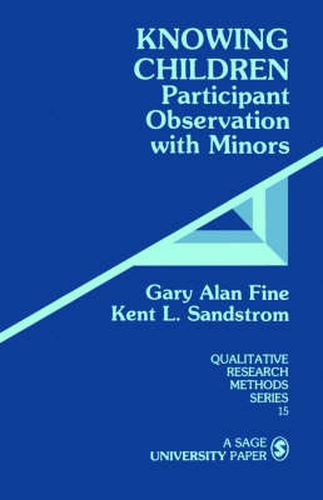Readings Newsletter
Become a Readings Member to make your shopping experience even easier.
Sign in or sign up for free!
You’re not far away from qualifying for FREE standard shipping within Australia
You’ve qualified for FREE standard shipping within Australia
The cart is loading…






When studying children too often it is assumed that our view of the world will be their view of the world. Knowing Children explores this lofty assumption and explodes various myths that researchers commonly hold about children. Using the assumptions that minors are knowledgeable about their world and that the worlds of minors are special and noteworthy, Fine and Sandstrom explore the worlds of children and demonstrate that adults can greatly benefit from studying their worlds through the use of qualitative research methods. In this insightful volume Fine and Sandstrom present timely methodological statements on doing participant observation with children. Drawing on case studies of children from three age groups they provide the first extended treatment of methodological problems with qualitative research involving children which integrates previous writings. They cover general issues involved in research with children, focusing on methodological and ethical concerns as well. This volume provides a fresh view of the worlds of children while providing an invaluable reference for the ethnographic researcher. Knowing Children helps the researcher understand how and why children react to adults doing ethnographic research. This work will prove to be specifically of interest to applied researchers in child development and education. It will also be of interest to those in other human services and more traditional ethnographic fields.
$9.00 standard shipping within Australia
FREE standard shipping within Australia for orders over $100.00
Express & International shipping calculated at checkout
When studying children too often it is assumed that our view of the world will be their view of the world. Knowing Children explores this lofty assumption and explodes various myths that researchers commonly hold about children. Using the assumptions that minors are knowledgeable about their world and that the worlds of minors are special and noteworthy, Fine and Sandstrom explore the worlds of children and demonstrate that adults can greatly benefit from studying their worlds through the use of qualitative research methods. In this insightful volume Fine and Sandstrom present timely methodological statements on doing participant observation with children. Drawing on case studies of children from three age groups they provide the first extended treatment of methodological problems with qualitative research involving children which integrates previous writings. They cover general issues involved in research with children, focusing on methodological and ethical concerns as well. This volume provides a fresh view of the worlds of children while providing an invaluable reference for the ethnographic researcher. Knowing Children helps the researcher understand how and why children react to adults doing ethnographic research. This work will prove to be specifically of interest to applied researchers in child development and education. It will also be of interest to those in other human services and more traditional ethnographic fields.